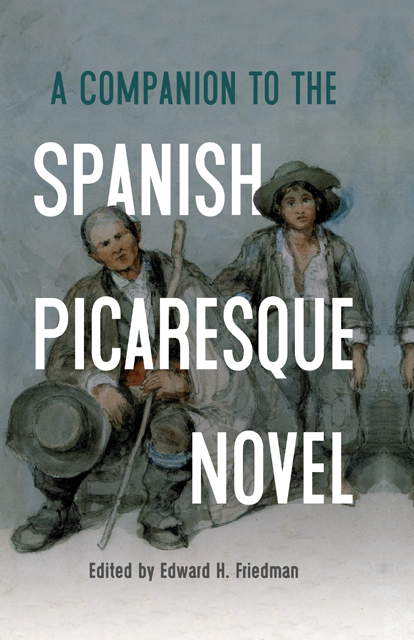Book contents
- Frontmatter
- Contents
- List of Illustrations
- List of Contributors
- Foreword
- 1 The Picaresque as a Genre
- 2 On the Picaresque and Its Origins
- 3 Francisco Delicado, La lozana andaluza
- 4 Lazarillo de Tormes
- 5 Mateo Alemán, Guzmán de Alfarache
- 6 Francisco de Quevedo, La vida del Buscón
- 7 La pícara Justina
- 8 Alonso Jerónimo de Salas Barbadillo, La hija de Celestina
- 9 Miguel de Cervantes and the Picaresque
- 10 Vicente Espinel, Marcos de Obregón
- 11 Carlos García, La desordenada codicia de los bienes agenos
- 12 Estebanillo González
- 13 Critical Approaches to the Picaresque
- 14 The Picaresque in Spanish America
- 15 Continuations: France and England
- 16 The Continuity of the Picaresque: Spain
- Bibliography
- Index
- Tamesis • Companions
15 - Continuations: France and England
Published online by Cambridge University Press: 11 January 2023
- Frontmatter
- Contents
- List of Illustrations
- List of Contributors
- Foreword
- 1 The Picaresque as a Genre
- 2 On the Picaresque and Its Origins
- 3 Francisco Delicado, La lozana andaluza
- 4 Lazarillo de Tormes
- 5 Mateo Alemán, Guzmán de Alfarache
- 6 Francisco de Quevedo, La vida del Buscón
- 7 La pícara Justina
- 8 Alonso Jerónimo de Salas Barbadillo, La hija de Celestina
- 9 Miguel de Cervantes and the Picaresque
- 10 Vicente Espinel, Marcos de Obregón
- 11 Carlos García, La desordenada codicia de los bienes agenos
- 12 Estebanillo González
- 13 Critical Approaches to the Picaresque
- 14 The Picaresque in Spanish America
- 15 Continuations: France and England
- 16 The Continuity of the Picaresque: Spain
- Bibliography
- Index
- Tamesis • Companions
Summary
Spanish picaresque fiction taught French and English novelists during the seventeenth and eighteenth centuries how to write compelling stories about struggling, ordinary individuals. Even as Don Quixote provoked the novel’s emergence as a formal riposte to the high flights of romance idealism, the grungier, more irreverent repudiations of heroic romance in Lazarillo, Guzman, and their imitators inspired new strains of low comic fiction which contributed just as much to the novel’s development. The picaro’s jaundiced accounts of roads, inns, taverns, and the often nefarious characters with whom he (and sometimes she) contended appealed to writers who had grown impatient with pat, plot-driven narratives, as it showed them how interesting life’s everyday environs could be. Yet the picaresque on its own terms did not readily translate to other national circumstances and literary contexts. And the characteristic picaresque ending – unresolved, defiant, and deliberately unsatisfying – practically demanded resolution without providing a usable roadmap. These were literary problems calling out for creative solutions, and in solving them writers on both sides of the Channel somewhat accidentally created the modern novel.
Picaresque narrative first came to England from France, having undergone a transformational journey. From Jean Saugrain’s Histoire plaisante, facetieuse, et recreative du Lazarille de Tormes espagnol (Pleasant, Comical, and Entertaining History of Lazarillo de Tormes, Spaniard, 1561) to David Rowland’s The Pleasaunt Historie of Lazarillo de Tormes a Spaniarde (1586), the picaro’s story bent to a new arc: instead of ending with a defiant threat and an uncertain promise to continue, Lazaro laments how the domestic peace he had finally acquired (as a complacent cuckold and father to a daughter) has been wrecked by unspecified ills. This new ending, clipped from the beginning of the spurious (and anonymous) La segunda parte del Lazarillo de Tormes (1555), keeps the pessimism while recasting the picaro as one who could know better. Lazaro has figured out how to restrain himself and accept his lot, but wicked fortune has other ideas. From truculent enforcer of his own story to woeful victim of circumstance, the picaro’s struggle in these French and English versions veers towards farce.
- Type
- Chapter
- Information
- A Companion to the Spanish Picaresque Novel , pp. 170 - 180Publisher: Boydell & BrewerPrint publication year: 2022



